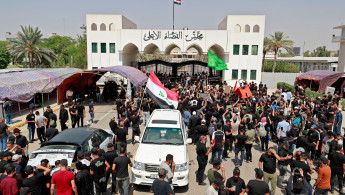Iraq’s Supreme Judiciary suspends all courts as political crisis escalates
Iraq's Supreme Judiciary Council announced the suspension of its activities and closed down all courts, including the Supreme Federal Court, across the country on Tuesday as a reaction against a sit-in in front of the council's offices in Baghdad's heavily fortified Green Zone by supporters of influential Shia cleric Muqtada al-Sadr.
The Supreme Judiciary Council said in a statement said a meeting was held between its members and the Supreme Federal Court early today convened in person and via teleconference in response to an earlier sit-in by Sadrist supporters.
The council accused Sadrist supporters of pressuring and threatening Iraq’s Supreme Federal Court to decide to dissolve parliament.
"Consequently, the attendees decided the suspension of all works by Iraq's Supreme Judiciary Council and all courts related to it as well as Iraq's Supreme Federal Court as a protest against these unconstitutional and illegal actions," reads part of the statement.
The council also called on Mustafa al-Kadhimi's caretaker government and the Sadrist movement to uphold their legal responsibilities and be aware of the consequences of the sit-in.
Later, the council issued arrest warrants against some pro-Sadr activists, including Sabah al-Saedi, former head of the integrity committee in the Iraqi parliament, on charges of threatening Iraqi judges.
Yusuf Mohammed Sadiq, the former speaker of the Kurdistan parliament and holder of a doctoral degree in Iraqi constitutional law, told The New Arab during a phone interview that Iraqi courts and judges can suspend their functions when they are under pressure or facing threats that affected their ability to work independently.
"Today's actions by Sadr's supporters put the works of Iraq's judiciary as well as Iraq's Supreme Federal Court under question that they have been working under pressure. I think the judiciary's measures are a normal response to the current situation," Sadiq said. "I think today's actions by Sadr’s supporters are furthering Sadr's isolation and eventually he will accept negotiations with his Shia rivals to settle their differences via dialogue."
Sadiq also stressed that Iraq's Supreme Judiciary Council has nothing to do with the political issues, but rather Iraq's Supreme Federal Court, an independent court, has the mandate to judge on such issues.
— وزير القائد - صالح محمد العراقي (@salih_m_iraqi) August 23, 2022
"The Iraqi judicial system is not excluded from being seen as partial in its decisions, but I think the decisions by Iraq's Supreme Federal Court following last year's elections are almost consistent with the articles of the Iraqi constitution that have been written with the soul of consensus," he added.
On whether Iraq's Supreme Federal Court can dissolve the country's parliament, Sadiq clarified that there are no clear articles in the Iraqi constitution that allow the court to do so, but taking into consideration that the Iraqi parliament has so far failed in its constitutional duties in electing a president for the country and voting for a new cabinet, the situation might empower the court to dissolve parliament.
"Sadr is righteous that the parliament has failed in its duties and thus should be dissolved, but how Sadr makes this demand is wrong, Sadr could stay in the legislature and collect enough votes to dissolve itself. I think It was an easier choice than their current one," remarked Sadiq.
A leader in the Sadrist Movement, speaking on condition of anonymity, said to Al-Araby Al-Jadeed, The New Arab's Arabic-language sister outlet, that the escalation by the movement came after they received information allegedly confirming that the head of Iraq's Supreme Judiciary Council, Judge Faiq Zaidan, pressured the judges of the Iraqi Supreme Federal Court to reject calls for dissolving the parliament.
Salih Mohammed al-Iraqi, a prominent Twitter user believed to be a senior Sadr loyalist, also tweeted that Sadr might soon dissolve the committee tasked with supervising the protests.
Iraqi political observers and social media users perceived such a step by Sadr would be a green light for his supporters to raid the presidential palaces and descend the country into further chaos.
تحويل الأمر للشعب بشأن المظاهرات
— الشيخ ثائر البياتي (@thaer350) August 23, 2022
يعني استباحة كل مقرات الفاسدين وبيوتهم والسحل بالشوارع 😉✌️
حل القضاء الفاسد هو انتصار لكل العراقيين الإصلاء
طرد برهم وأغلاق مقر رئاسه الجمهورية المنتهي الصلاحيه مطلب شعبي
يا حوم اتبع لو جرينا
For his part, Iraqi prime minister Kadhimi, cut short his visit to Egypt and urgently returned to Iraq to control the situation.
Sadr and his political rivals, most of whom are Iran-backed Shia groups, have been at odds since last year's parliamentary elections in October. Sadr won the largest share of seats but failed to form a majority government.
Sadr insists that Iraq's Supreme Federal Court dissolve parliament and new elections be held. The Coordination Framework, an alliance of Iran-backed parties, insists that parliament would have to convene to dissolve itself.
The Iraqi Supreme Federal Court on Wednesday postponed its session to look at the complaints raised by supporters of Sadr asking the court to dissolve the country's parliament until the end of this month.





 Follow the Middle East's top stories in English at The New Arab on Google News
Follow the Middle East's top stories in English at The New Arab on Google News


